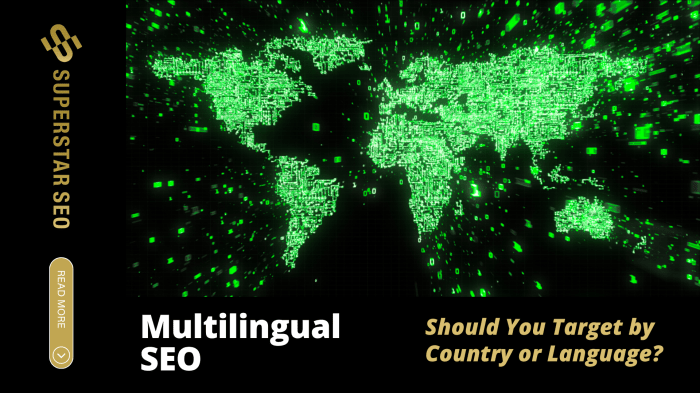Web seo expert – Web expert is a critical role in today’s digital landscape. They are responsible for driving organic traffic to websites through various strategies, from technical optimization to content creation and link building. This guide delves into the core competencies, duties, and trends shaping the field, providing a thorough understanding of this essential role.
This detailed exploration examines the skills and attributes of a successful web expert, including essential technical and soft skills, problem-solving approaches, and the tools and technologies they employ. It also analyzes modern trends and the future outlook of the field, highlighting the impact of emerging technologies and strategies on success.
Defining a Web Expert

Source: dotnek.com
A web expert is a specialist dedicated to optimizing websites for search engines, thereby improving their visibility and ranking in search results. This translates directly to increased organic traffic, leading to more potential customers and higher conversion rates. Their core focus is understanding and applying best practices in search engine optimization to drive significant business value.
A web expert’s work is not merely technical; it’s deeply intertwined with understanding the target audience and the competitive landscape. Their expertise spans a wide range of tasks, from research and content creation to technical website audits and link-building strategies. This multifaceted approach ensures a comprehensive optimization strategy, leading to sustainable growth for a company’s online presence.
Core Responsibilities and Skill Sets
A web expert possesses a diverse skill set, including a deep understanding of search engine algorithms, technical website optimization, content creation, and link-building strategies. Their core responsibilities include conducting thorough research, analyzing website performance, and creating high-quality content optimized for search engines. They also actively monitor and adapt to changes in search engine algorithms, ensuring the website remains competitive and effectively targets the desired audience.
Roles and Responsibilities in a Company
A web expert can play various roles within a company, depending on its size and structure. They might be responsible for developing and implementing the entire strategy, or focus on specific aspects like content optimization or technical. Their roles may also include collaborating with marketing teams, content creators, and developers to achieve consistent, sustainable results. In smaller companies, the expert might wear multiple hats, handling tasks across the spectrum.
Types of Expertise
Web expertise is categorized into various specializations. Technical focuses on optimizing website architecture, site speed, and mobile-friendliness to improve search engine crawlability and indexation. Content emphasizes creating high-quality, relevant content that attracts and engages target audiences, incorporating targeted keywords naturally within the text. Link building focuses on acquiring high-quality backlinks from reputable websites, which signals to search engines the credibility and authority of the website being optimized.
Essential Tools and Technologies
Web experts utilize a range of tools and technologies in their daily work. These include research tools (like SEMrush, Ahrefs, or Moz), website analytics platforms (such as Google Analytics), technical auditing tools, and rank tracking software. Proficiency in these tools allows them to monitor website performance, analyze competitors, and implement data-driven optimization strategies.
Comparison with Other Related Roles
| Feature | Web Expert | Digital Marketer | Content Writer |
|—|—|—|—|
| Primary Focus | Optimizing websites for search engines | Overall online marketing strategy | Creating engaging and informative content |
| Key Skills | Technical , link building, research | Social media marketing, paid advertising, content marketing | Writing, storytelling, content formatting |
| Tools Used | tools, analytics platforms | Marketing automation tools, social media management tools | Writing software, content management systems |
| Goals | Improve website ranking and organic traffic | Increase brand awareness, drive conversions | Enhance brand image, create valuable content |
Skills and Attributes of a Web Expert

Source: infidigit.com
A successful web expert possesses a unique blend of technical proficiency and soft skills. They are adept at understanding search engine algorithms, optimizing website structures, and driving organic traffic. Furthermore, they excel at collaborating with clients and teams to achieve shared goals.
This expertise is built on a foundation of ongoing learning and adaptability. The digital landscape is constantly evolving, demanding a continuous effort to stay abreast of industry trends and best practices. An effective web expert embraces challenges and utilizes data-driven strategies to optimize website performance.
Essential Technical Skills
Understanding search engine algorithms is fundamental to a web expert’s toolkit. This includes familiarity with Google’s algorithms, as well as the intricacies of other major search engines. A deep comprehension of research techniques is also vital. This involves identifying relevant search terms, analyzing search volume, and understanding search intent. Technical skills, such as website structure optimization, mobile-friendliness, and site speed optimization, are equally crucial. An expert must also be proficient in various tools, such as Google Analytics and Search Console, to track and analyze website performance.
Critical Soft Skills
Communication and collaboration are essential. A web expert must effectively communicate complex concepts to clients and team members. Active listening is also crucial to understanding client needs and tailoring strategies accordingly. Problem-solving skills are critical in navigating the often-complex challenges encountered in . Adaptability is vital for responding to changes in search engine algorithms and industry trends. A strong work ethic and attention to detail are also essential for delivering high-quality results.
Different Approaches to Web Strategies
Various approaches exist for optimizing websites for search engines. Some experts emphasize technical, focusing on site architecture, speed, and mobile-friendliness. Others prioritize content marketing, creating high-quality, engaging content that attracts and retains visitors. Still others concentrate on link building, acquiring backlinks from reputable websites to enhance a website’s authority. Successful experts often blend these approaches to create comprehensive strategies tailored to each client’s specific needs and goals.
Staying Updated on Industry Trends
Staying informed about industry trends and best practices is paramount. experts actively follow industry blogs, attend conferences and webinars, and participate in online communities. They also closely monitor algorithm updates released by search engines, adjusting their strategies as needed. Continuous learning is a hallmark of a successful web expert. For instance, an expert might attend a conference on best practices, or subscribe to a newsletter focused on algorithm updates.
Problem-Solving Approach in
Problem-solving often involves a structured approach. Experts typically define the problem, gather data, analyze the data, develop a solution, implement the solution, and finally measure the results. This iterative process allows for adjustments and refinements based on ongoing performance analysis.
Stages of Problem-Solving
| Stage | Description |
|---|---|
| Problem Definition | Identify the issue (e.g., low organic traffic, poor rankings). |
| Data Gathering | Collect relevant data from various sources (e.g., Google Analytics, Search Console, website analytics). |
| Analysis | Analyze the gathered data to understand the root cause of the problem. |
| Solution Development | Develop a strategic plan to address the identified issue. |
| Implementation | Execute the developed plan, optimizing the website and content. |
| Measurement | Track and monitor the results of the implemented strategy to assess effectiveness. |
Duties and Responsibilities
A web expert plays a crucial role in driving organic traffic to a website. Their daily tasks revolve around optimizing online visibility and ensuring a strong online presence. This involves a multifaceted approach that encompasses technical, content strategy, and ongoing performance analysis.
A successful expert understands the dynamic nature of search engine algorithms and continuously adapts their strategies to stay ahead of the curve. They are adept at identifying opportunities for improvement and implementing them with precision, ensuring websites consistently rank high in search results.
Typical Daily Tasks, Web seo expert
A typical day for a web expert involves a range of tasks, from research to performance analysis. These tasks ensure websites meet search engine guidelines and attract organic traffic. They meticulously analyze search engine trends and competitor strategies to devise effective campaigns.
- Researching to identify relevant and high-volume search terms.
- Analyzing website performance using various tools and metrics, including Google Analytics and Search Console.
- Optimizing website content and meta descriptions for improved search engine visibility.
- Building high-quality backlinks from reputable websites.
- Staying up-to-date with the latest search engine algorithm updates and best practices.
- Monitoring and adjusting strategies based on performance data.
Optimizing Web Pages for Search Engines
Effective optimization of web pages for search engines involves several critical steps. These steps include technical aspects, content quality, and user experience. It is essential to align optimization efforts with the needs and intent of search engine users.
- On-page optimization focuses on elements within the website. This includes optimizing title tags, meta descriptions, header tags, image alt text, and URL structure. It is vital to ensure that the content is relevant to the target audience.
- Off-page optimization focuses on activities outside the website. This involves acquiring high-quality backlinks from authoritative websites. These backlinks act as endorsements, signaling to search engines the credibility and importance of the website.
- Technical addresses website architecture, sitemaps, mobile-friendliness, and page speed. A fast and mobile-friendly website significantly enhances the user experience and search engine ranking.
Analyzing Website Performance
A crucial aspect is consistently monitoring and analyzing website performance. This involves using various tools and metrics to understand the effectiveness of strategies.
- Using tools like Google Analytics and Google Search Console to track website traffic, rankings, and user behavior.
- Monitoring key metrics such as bounce rate, average session duration, and conversion rate to identify areas for improvement.
- Regularly reviewing and interpreting data from these tools to identify patterns and trends.
- Identifying any technical issues that might be hindering search engine visibility.
Implementing and Tracking Campaigns
Implementing and tracking campaigns requires a structured approach. This involves careful planning, execution, and ongoing monitoring.
- Developing a comprehensive strategy outlining specific goals, targets, and tactics.
- Implementing the strategy, including on-page and off-page optimization.
- Using analytics platforms to monitor campaign performance and make necessary adjustments.
- Analyzing the effectiveness of different strategies and adjusting accordingly.
Strategies to Improve Website Rankings
Several strategies can enhance website rankings in search engine results pages (SERPs). A key element is understanding user intent and providing relevant content.
- Research and targeting involve identifying relevant searches that users are searching for.
- Content optimization focuses on creating high-quality, informative, and engaging content that addresses user needs.
- Building high-quality backlinks from reputable websites enhances website authority and credibility.
- Technical optimization addresses website structure, site speed, and mobile-friendliness.
Campaign Reporting Methods
Different methods exist for reporting on campaigns. Each method serves a specific purpose and provides unique insights into campaign performance.
| Reporting Method | Description |
|---|---|
| Summary Reports | Provide a high-level overview of campaign performance, highlighting key metrics like website traffic and rankings. |
| Detailed Reports | Offer granular insights into various aspects of the campaign, including individual performance, backlink profiles, and technical issues. |
| Custom Reports | Allow for the creation of tailored reports that focus on specific aspects of the campaign relevant to the client’s needs. |
| Regular Performance Updates | Involve providing regular updates to clients on the progress of the campaign and any adjustments made. |
Tools and Technologies Used

Source: medium.com
Web experts leverage a diverse range of tools and technologies to optimize websites for search engines and improve online visibility. Understanding these tools and their applications is crucial for effective strategies. A deep understanding of how these tools function allows for data-driven decision-making, leading to tangible improvements in website performance.
A comprehensive toolkit allows experts to monitor website traffic, analyze user behavior, and identify areas for optimization. This in-depth analysis allows them to implement strategies that enhance organic search rankings and drive targeted traffic.
Key Software and Tools
professionals utilize a wide range of software and tools to perform various tasks, from research to technical audits. These tools are essential for staying updated with industry trends and adapting strategies accordingly.
- Research Tools: These tools aid in identifying relevant search terms and phrases that users are searching for. They provide insights into search volume, competition, and difficulty. Tools like SEMrush, Ahrefs, and Moz Explorer are examples of such resources. Using these tools, experts can pinpoint high-value keywords that drive targeted traffic to websites.
- Website Analysis Tools: Tools such as Screaming Frog and Google Search Console help in technical audits, uncovering issues like broken links, slow page loading times, and mobile-friendliness. This allows experts to identify and address critical technical elements that directly impact search engine rankings.
- Rank Tracking Tools: Tools like SEMrush and Moz Pro monitor a website’s position in search engine results pages (SERPs) for specific s. This continuous monitoring enables experts to track the effectiveness of their strategies and adapt to algorithm changes.
Analytical Tools for Tracking Website Performance
Web analytics tools provide crucial data for understanding website traffic, user behavior, and engagement. These tools are essential for measuring the success of efforts and identifying areas for improvement.
- Google Analytics: This industry-standard tool provides detailed insights into website traffic, user behavior, and conversion rates. Key metrics like bounce rate, session duration, and page views are crucial for evaluating user engagement and identifying potential areas for improvement. Google Analytics allows for tracking and monitoring user interactions on the website, helping experts make informed decisions regarding content strategy and user experience optimization.
- Google Search Console: This free tool from Google offers insights into how search engines view a website. It helps identify indexing issues, crawl errors, and other technical problems. This information is vital for maintaining optimal website performance and ensuring search engines can properly index the website’s content.
Industry-Standard Tools and Software
A variety of tools are commonly used by experts to streamline tasks and gain valuable insights. These tools often integrate to provide a comprehensive view of website performance.
- SEMrush: This comprehensive toolkit offers a suite of features, including research, rank tracking, competitor analysis, and site audits. SEMrush allows professionals to gain a comprehensive understanding of their competitors’ strategies and adapt their approach accordingly. The extensive data provided by SEMrush enables data-driven decision-making for effective strategies.
- Ahrefs: Ahrefs is another robust tool offering comprehensive research, backlink analysis, site audit tools, and rank tracking capabilities. It allows for in-depth competitor analysis, providing professionals with a detailed view of their competitors’ strategies and performance.
- Moz Pro: Moz Pro offers a suite of tools, including research, site audits, rank tracking, and backlink analysis. It provides valuable insights into performance and helps in identifying and addressing any critical issues.
How Tools Monitor Website Traffic and User Behavior
tools provide a wealth of data that helps to understand how users interact with a website. This detailed analysis is crucial for optimizing user experience and improving search engine rankings.
- Traffic Sources: Tools track where website traffic originates (e.g., organic search, social media, referrals). This insight helps in understanding which marketing channels are most effective in driving traffic.
- User Behavior: Tools monitor user behavior on the website, such as pages visited, time spent on pages, and conversion rates. This data helps identify areas where user experience can be improved and content can be optimized.
Using Analytics Tools to Identify and Resolve Issues
By analyzing data from various tools, experts can identify and resolve potential issues that negatively impact search engine rankings.
- Identifying Crawl Errors: Tools like Google Search Console and Screaming Frog can identify crawl errors, helping experts understand issues with website structure that search engine crawlers may encounter.
- Identifying Technical Issues: Analytics tools provide insights into technical problems, such as slow page loading speeds, broken links, and mobile-friendliness issues. Addressing these issues enhances website performance and search engine rankings.
Comparison of Popular Tools
| Tool | Key Features |
|---|---|
| SEMrush | Comprehensive suite of tools, including research, rank tracking, competitor analysis, site audits, and more. |
| Ahrefs | Robust backlink analysis, research, site audit tools, rank tracking, and competitor analysis capabilities. |
| Moz Pro | Provides a suite of tools, including research, site audits, rank tracking, and backlink analysis. |
| Google Analytics | Detailed insights into website traffic, user behavior, and conversion rates. |
| Google Search Console | Provides insights into how search engines view a website, identifying indexing issues, crawl errors, and other technical problems. |
Modern Trends and Future Outlook
The web landscape is constantly evolving, driven by technological advancements and shifting user behaviors. Staying ahead of these trends is crucial for any successful expert. This section explores the current and emerging trends, technologies, and the evolving role of the expert in this dynamic digital environment.
The role of a web expert is not merely about optimizing for search engines; it’s about understanding and responding to the ever-changing needs and expectations of online users. This involves a deep understanding of how search engines adapt to user behavior and how emerging technologies are influencing search results.
Current Trends Shaping the Web Landscape
Several key trends are significantly impacting the way websites are optimized for search engines. These include the increasing importance of user experience (UX), the rise of mobile-first indexing, and the integration of voice search. Understanding and addressing these trends is crucial for maintaining a competitive edge.
Emerging Technologies and Strategies Impacting
Artificial intelligence (AI) and machine learning (ML) are rapidly transforming the landscape. AI-powered tools are becoming increasingly sophisticated in analyzing user behavior and identifying relevant search terms. This shift necessitates a nuanced understanding of how AI influences strategies.
Evolving Role of a Web Expert in a Digital Environment
The modern expert is more than just a technician. They need to be well-versed in data analysis, able to interpret user behavior, and skilled in adapting strategies to changing technological landscapes. They must also be adept at utilizing emerging technologies like AI and ML to optimize content and improve website performance.
Examples of AI and Machine Learning Influence on
AI and ML are influencing in several ways. For instance, AI-powered tools can analyze large datasets of search queries to identify trending topics and tailor content accordingly. Furthermore, AI algorithms can predict user intent with greater accuracy, allowing experts to create content that directly addresses user needs. This precision results in more effective campaigns.
Predicted Future Developments in Web
Several future developments are expected to shape the landscape. These include a greater emphasis on semantic search, further integration of AI and ML in search engine algorithms, and the growing importance of content quality over density.
Impact of Various Factors on Success
| Factor | Impact on Success |
|---|---|
| User Experience (UX) | Positive correlation: improved UX leads to higher rankings and increased user engagement. |
| Mobile-First Indexing | Critical: websites optimized for mobile devices will rank higher. |
| Voice Search | Growing importance; content should be optimized for conversational queries. |
| Artificial Intelligence (AI) | Significant impact: AI-powered tools are used to analyze user behavior and tailor content. |
| Content Quality | High correlation; high-quality content is rewarded by search engines. |
| Technical | Essential technical aspects of the website, like site speed and mobile-friendliness, impact rankings. |
Illustrative Examples of Web Expertise: Web Seo Expert

Source: ifamemedia.com
A successful web strategy hinges on a deep understanding of search engine algorithms and user behavior. Expert practitioners leverage this knowledge to enhance website visibility and drive organic traffic, ultimately leading to improved business outcomes. This section provides concrete examples of successful strategies implemented by experts.
Effective solutions often require a holistic approach, considering technical aspects, content strategy, and link building. The examples below demonstrate how seasoned professionals adapt their strategies to various website contexts and evolving search engine algorithms.
Successful Strategies Implemented by Experts
Expertise extends beyond basic research. Successful implementations involve a multifaceted approach. Strategies often involve meticulous research, high-quality content creation, and robust link building. This holistic approach, combined with ongoing monitoring and adaptation, leads to sustained improvements in search engine rankings.
Case Studies Showcasing Effective Solutions
Numerous case studies highlight the positive impact of strategies. One example involves a local bakery that saw a significant increase in online orders after implementing a strategy focused on location-based SEO and local citations. Another instance demonstrates how an e-commerce store boosted sales by optimizing product pages for relevant keywords and implementing a robust internal linking structure. These examples illustrate the tangible benefits of targeted efforts.
Adapting to Changing Search Engine Algorithms
Search engine algorithms are constantly evolving. Expert practitioners demonstrate a remarkable ability to adapt to these changes. For instance, Google’s updates regarding mobile-first indexing required website owners to optimize their sites for mobile responsiveness. Successful adaptation involved a focus on responsive design, page speed optimization, and a user-friendly mobile experience.
Real-World Situations Demonstrating Successful Implementations
Real-world situations demonstrate the practical application of principles. Consider a travel agency that significantly increased bookings by optimizing its website content for specific travel destinations and popular search terms. Another example involves a blog that increased its readership by consistently publishing high-quality, informative content optimized for relevant search. These scenarios underscore the practical value of implementation.
Positive Outcomes of Efforts
Efforts often lead to tangible improvements in various metrics. These outcomes include higher search engine rankings, increased organic traffic, improved user engagement, and ultimately, higher conversion rates. The positive outcomes are directly linked to effective strategies.
Comparison of Different Case Studies
| Case Study | Website Type | Primary Strategy | Key Outcomes |
|---|---|---|---|
| Local Bakery | Local Business | Location-based SEO, local citations | Increased online orders |
| E-commerce Store | E-commerce | Product page optimization, internal linking | Increased sales |
| Travel Agency | Service-based | Destination optimization, targeting | Increased bookings |
| Blog | Content-based | High-quality content, optimization | Increased readership |
Conclusion
In summary, the web expert plays a pivotal role in maximizing online visibility and driving business growth. Understanding their diverse skill sets, responsibilities, and the evolving landscape of is crucial for both individuals aspiring to this profession and businesses seeking to leverage its potential. This guide offers a comprehensive overview, providing a roadmap for navigating the complexities of modern.






